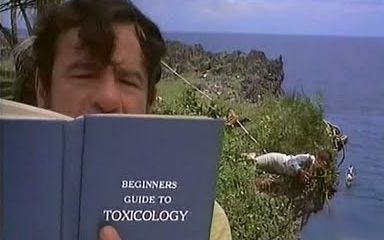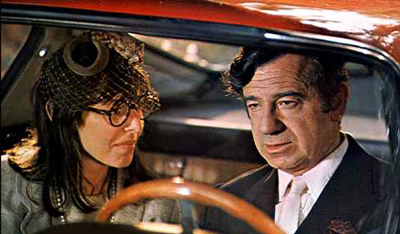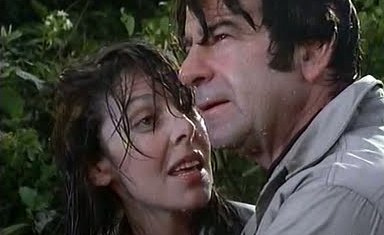
 |
|
|
|
A one-of-a-kind comedy from the early 1970s, A New Leaf marked the directing debut of comedienne-writer Elaine May. Although frequently omitted when lists of pioneering woman film directors are compiled, May could very well have been the first female director of a mainstream American studio release since Ida Lupino. Despite rapturous critical praise for A New Leaf Ms. May signed only three more pictures as director. Her second outing The Heartbreak Kid was her only hit, and her last two efforts were conspicuous flops. May's expensive Ishtar made her an industry punching bag for studios and producers wishing to wrest power and creative control from the hands of directors. The witty and insightful A New Leaf is directed in an understated style developed over Ms. May's many years as a comedienne and writer, with and without her original performing partner Mike Nichols. Star Walter Matthau had been playing in essentially the same aggressive, mouthy comedy groove since Billy Wilder's The Fortune Cookie. May hands him a refreshingly different character, an insufferable elitist who has "preserved in his own lifetime a way of life that was dead before he was born." This may be Matthau's last movie before his face started to get heavy -- becoming an occasional romantic leading man is not easy at age fifty. 
A tale of the true meaning of money, privilege and entitlement, A New Leaf focuses on Henry Graham (Walter Matthau), a Manhattan millionaire who has never worked and fastidiously refuses to acknowledge the needs or rights of others. But the luxury-loving Henry has been spending way too much for far too long. By the time his patient lawyer Beckett (William Redfield) finally gets his attention, Henry is virtually penniless. As a lifelong adherent to the indolent, patrician lifestyle, Henry has no ability to make a legitimate living. He'll soon lose his glorious town house, his butler Harold (George Rose) and his expensive Ferrari. Henry decides against suicide, instead taking the last-ditch suggestion offered by Harold: borrow some cash from his venal, vindictive Uncle Harry (James Coco) and find himself a rich woman to marry, quick. After a few false starts Henry discovers Henrietta (Elaine May), a mousy, clumsy botanist who is so trusting that she doesn't see through Henry's insincere advances. Henry makes a supreme effort to charm the clueless Henrietta. Harold is dismayed to discover that Henry's intentions are doubly nefarious: he plans to follow matrimony with murder. Filmmakers with a revue comedy background need more than a campaign bag of funny jokes. Theodore J. Flicker's stylishly successful farce The President's Analyst boils down to a series of revue-style comedy scenes, some with former members of Chicago's Second City troupe. Elaine May's comic style was developed in The Compass Players, the precursor to The Second City. Her incisive little show spoofs no genres and tries for no grand effects, yet scores with every satirical barb. She has us in her pocket from the first scene of her effortlessly accurate comic view of the rich, a never-bettered extended gag about the realities of Ferrari ownership. The phrase "Carbon on the valves" should have entered the public lexicon as a generic term for any technician trying to snow a client with vague non-information. The Ferrari gag is followed by one of the funniest, driest comic scenes ever, when the lawyer Beckett ever so patiently tries to penetrate Henry's umpteen layers of denial about his new state of poverty. Beckett approaches the touchy subject from multiple angles yet Henry still resists. When Beckett modestly volunteers the information that he has been personally paying some of Henry's debts, Henry isn't the slightest bit impressed or mollified. A colossal inconvenience has been perpetrated, and that's the only issue he wishes to address. The verbal rhythm of this scene and several others reminds us of classic May-Nichols routines: the more civilized Beckett tries to be in the face of Henry's abuse, the funnier the scene gets. 
Matthau's Henry Graham is a terrific characterization that requires both intelligence and a myopic disdain for others. In Henry's view, he's a hero making the ultimate sacrifice. He'll lower himself to the indignity of speaking to other people as equals, just long enough to ensnare a rich mate. As impossible as this seems (Henry is the most unlovable suitor imaginable), the perfect pigeon appears. Elaine May's Henrietta is an adorably maladroit klutz. She distills 101 social faux pas into one unlucky girl -- wearing clothes with price tags still attached, leaving big stain lines on her lip when she drinks. Her idea of a great drink is Mogen-David extra-heavy Malaga wine with soda water and lime juice. Yet Henrietta is neither stupid nor inferior. An accomplished academic, she's a botany professor with personal goals, intensely focused on her little ferns and fronds. Her greatest ambition is to find a new species, have it named after her, and become immortal. We love Henrietta on sight -- she's the patron saint of every high school girl unfairly branded as a social liability. Henrietta is so socially inept that she takes Henry's insulting endearments at face value. It's a match made in bankruptcy court. A series of endearingly awkward dates ensues. Henry's plans are held up by his discovery that Henrietta's lawyer McPherson (Jack Weston) and all of her servants (led by the marvelous Doris Roberts) have been systematically fleecing her, turning Henrietta's mansion into a 24-7 party palace. Will Henry cut through McPherson's web of deceit? Will he carry out his plan to murder his wife? Will Henrietta master one single rule of social etiquette? The intensely creative and prolific Elaine May did not play by Hollywood's rules. After going far over budget and spending the better part of a year editing A New Leaf, May reportedly turned in an overly long director's cut, which Paramount's Robert Evans proceeded to radically reshape. When the smoke cleared A New Leaf had been shorn of much of its darker content. According to various sources, after the Henry Graham character dismisses Henrietta's corrupt staff, her lawyer McPherson and servant Smith (William Hickey) retaliate with a threat of blackmail. Henry eliminates them both with poison. The final cut drops this entire subplot. As finished, A New Leaf's quirky (and far more romantic) resolution works quite well. Yet it would be fascinating to know if Elaine May's original experiment in black comedy came together. 
The debate over A New Leaf's post production battle was re-opened eighteen years later. Ms. May's Ishtar was excoriated as another reason why "irresponsible" creatives should not be allowed to control the filmmaking process. Elaine May's films didn't set industry records, but they had an edge missing from the work of many another high-profile woman director. The Heartbreak Kid is a merciless lampoon of matrimonial cruelty that made male audiences squirm, and Mikey and Nicky almost beats John Cassavetes at his own improvisational game. Had the box office dice landed differently once or twice, we may have seen more interesting movies from the talented writer-director. But it is unfair to make a feminist argument out of the conflicts between Ms. May and her producers, as three of her four films went wildly over budget and schedule. Few directors of either sex have overcome that liability. Olive Films' Blu-ray of A New Leaf is an extremely welcome release, as this very funny show hasn't been a TV staple and is considered something of a rarity. It plays beautifully on a big screen, and almost as well in an HD home video environment. The transfer is quite good, even if it reveals occasional rough edges in the cinematography. On the whole the production has a handsome look, with soft colors. With Elaine May everything is performance, and A New Leaf is 102 minutes of delightful characterizations. Neal Hefti's bouncy music score wisely doesn't give away the game by telegraphing the tone of dialogue scenes. The show has plenty of opportunities for funny underscore moments, the best probably being Henry's terror-stricken nightmares of being de-classed to the level of an ordinary nobody. In one fantasy a well-heeled friend catches him driving an unexceptional middle-class car. To Henry that's a fate worse than death.
On a scale of Excellent, Good, Fair, and Poor,
A New Leaf Blu-ray rates:
Reviews on the Savant main site have additional credits information and are often updated and annotated with reader input and graphics. Also, don't forget the 2011 Savant Wish List. T'was Ever Thus.
Review Staff | About DVD Talk | Newsletter Subscribe | Join DVD Talk Forum |
| ||||||||||||||||||